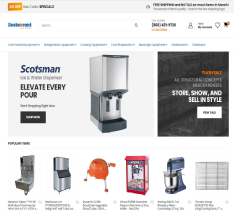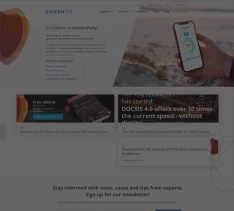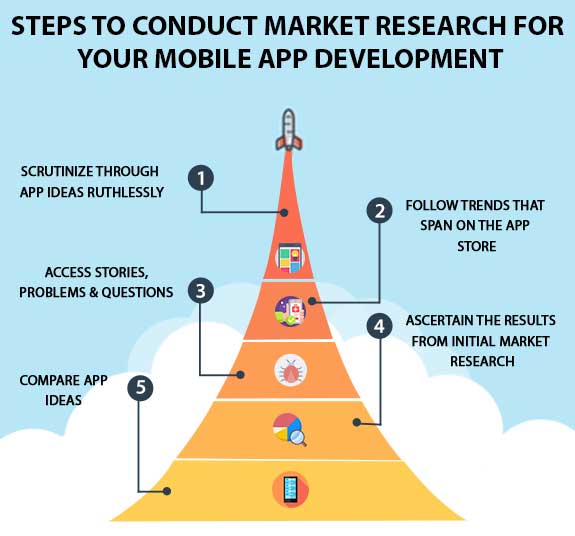Our interactions with the world around us have changed as a result of modern smartphones. Millennials would find it extremely difficult to imagine using their mobile platform only for phone calls or text messages.
Today’s apps have spawned an on-demand economy where every good or service a person might ever need is at their fingertips. There is an app for everything these days, including ordering food, doing laundry, hailing a cab, finding employment, and performing household duties.
Businesses have been pushed to heavily utilize custom mobile app development as their primary channel of building mobile apps that drive business as a result of the rising smartphone usage around the world.
The number of mobile app downloads has been increasing steadily since 2016, as it reached 255 billion app downloads in 2022, an increase of more than 80% from 140.7 billion app downloads in 2016.
According to Statista, it is estimated that during this year, in 2023, the approximate number of app downloads would reach 299 billion. These statistics demonstrate the incredible expansion and appeal of the mobile app market.
Do you have any questions concerning the pricing, the process, or the most prominent app features? You can stop wondering because this comprehensive guide to the world of developing a mobile app contains all the answers.
What is Mobile App Development?
Mobile app development is the process of building software that runs on mobile devices. This process often involves ideation, designing, coding, testing, and deployment of mobile apps to different app stores, such as the Apple App Store and Google Play Store.
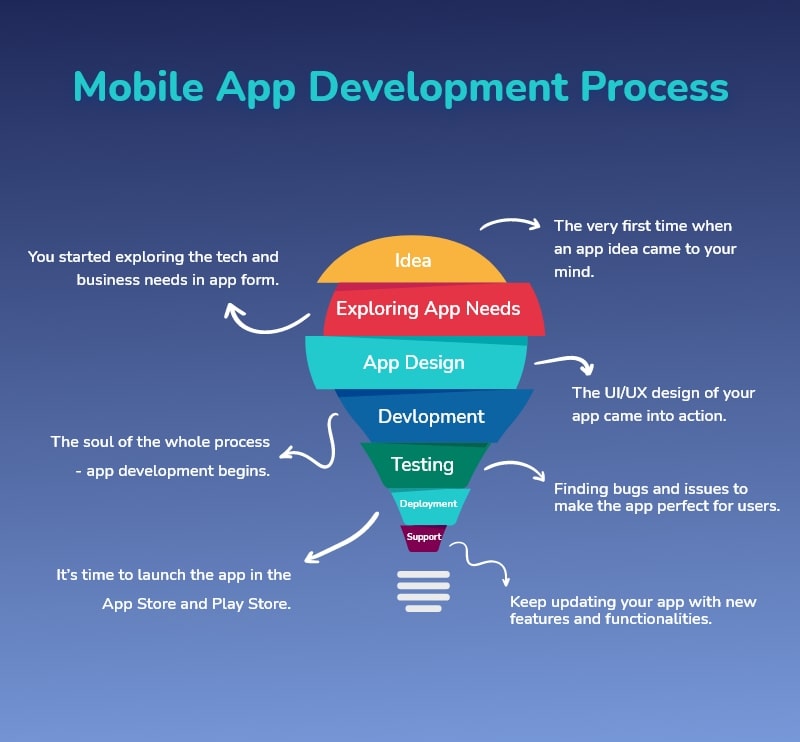
Image source: https://www.excellentwebworld.com/
Mobile app development typically involves a team of developers, designers, and project managers who work together for developing a mobile app that’s user-friendly and scalable. The process starts with the development of a concept, which is then turned into a wireframe or prototype. Once the concept is finalized, the development team begins to work on designing, coding, and testing the app.
The design process includes creating a visual layout for the app including for overall look and feel. The coding process involves writing the code using programming languages such as Java, Swift, or C#. Subsequently, the testing process involves checking the app for bugs, compatibility issues, and user experiences.
Once the app is developed and tested, it can be deployed to different app stores for users to download and use. The app can also be updated and maintained to fix any issues that may arise and to add new features.
Also Read: 21 Profitable Mobile App Ideas That Work Wonders
Why your business needs a mobile app?
Mobile app development is constantly evolving, and new technologies and frameworks are continuously being introduced. This makes the app development process more efficient and user-friendly for your business.
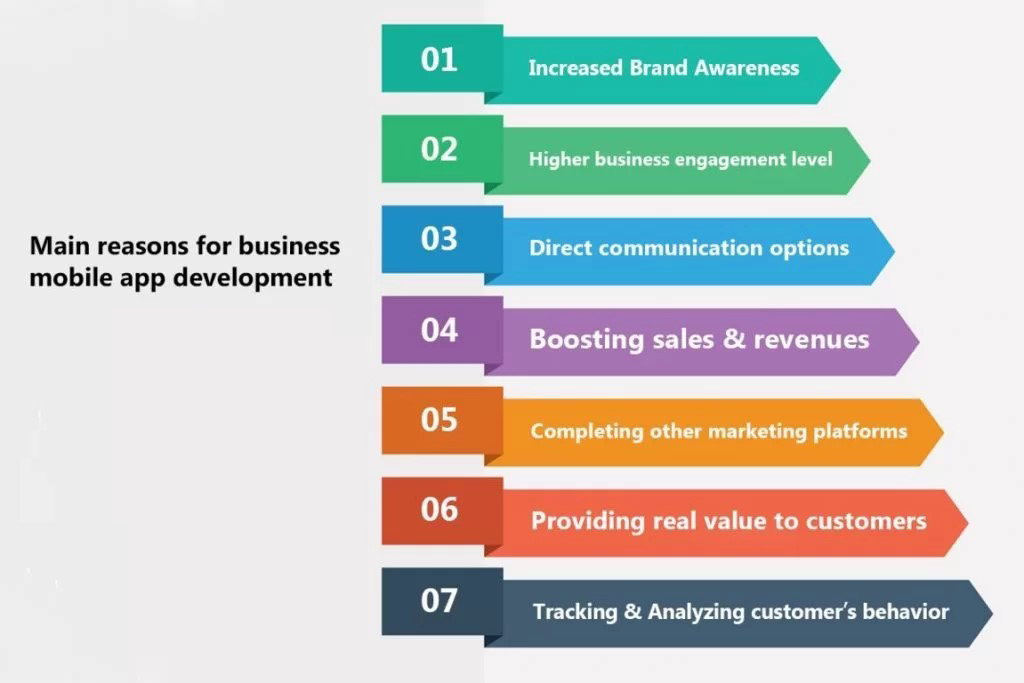
Image source: https://admysys.com/
Not having a mobile site or mobile app is like being closed every Thursday – Michael Singer, Google
You cannot afford to overlook its advantages as a business owner. A few ways that mobile app development helps businesses are listed below:
-
Dominate Your Niche
Mobile apps perform significantly better than traditional websites and digital platforms when it comes to facilitating quick communication and enhancing the consumer experience. A mobile app strategy can enhance your company’s operations in a variety of ways, and over time, you will notice how this affects your revenue generation as well.
-
Build Your Own Marketing Channel
Your marketing efforts and campaigns can be greatly enhanced by the information gathered from user sessions within the app. Compared to other traditional marketing channels, an app enables your digital marketers to provide customers with more relevant and personalized content once they have access to all the data.
-
Boost Sales and Revenue
In this digital era, the idea of getting a dedicated mobile app seems compelling, but knowing that it will boost sales makes it even more enticing. Businesses can digitalize their services and make them easily accessible on any mobile device by creating a well-designed, user-friendly mobile app.
For example, it doesn’t matter if you own a brick-and-mortar store or an eCommerce website; developing a mobile app for your business can elevate your sales and revenue. On top of that, if you integrate eCommerce development solutions with that, that would act like icing on the cake.
According to Shoutem, it is projected that the mobile app market will grow to around $935 billion by 2023, making mobile apps a significant source of revenue.
-
Better Customer Experience
Customers are more interested than ever in immersive experiences, particularly when they are shopping online. That’s where a clearly defined mobile app strategy can play a role.
A mobile app enables businesses to give customers a smooth buying experience. Customer experiences in eCommerce can be improved using one-click payment, SMS confirmations, push alerts, and other best-in-class mobile features. Don’t know what an eCommerce experience is? Read this article for a better understanding.
In a nutshell, the use of mobile apps enables tremendous customization opportunities for your customers. Engaging the user throughout the purchase process and providing seamless customization can help you accomplish better customer experiences.
-
Boost Your Brand Awareness
An app can significantly increase brand recognition for your business if used properly. Always keep in mind that your app is very similar to an empty billboard sign. Adding informative material, style, or engagement can liven it up. But more importantly, ensure that your mobile app is beautifully developed, striking to look at, and well-marketed.
Additionally, a terrific mobile app can elevate your awareness to a brand-new degree. The more your app is downloaded and utilized, the more known your brand, goods, and services will be to your target market.
Does Your Business Need a Mobile App?
Types of Mobile Apps
There are multiple popular approaches for mobile app development and it is crucial for business owners to choose the right one. It is essential that you study the app dynamics such as desired interface, scalability, and audience type to choose the ideal type of mobile application.
Here are the multiple types of app development approaches according to your needs:
-
Native Apps
Native apps are typically built using the official development tools and frameworks provided by the operating system vendor and can take full advantage of the device’s hardware and software capabilities. These apps are specifically designed to run on a particular mobile operating system, such as iOS or Android.
-
Hybrid Apps
These apps are built using web technologies such as HTML, CSS, and JavaScript but are packaged as native apps and can be distributed through app stores. Hybrid apps can run on multiple platforms but may not have the same performance and capabilities as native apps. It’s a nice option for those who want to integrate apps with custom web solutions to gain maximum control and compatibility.
To know more about the difference between Hybrid and Native App Development, check out with this link!
Progressive Web Apps (PWA) are web apps that can be accessed through a web browser but can also be installed on a user’s device like native apps. PWAs offer offline functionality, push notifications, and other features typically associated with native apps.
Cross-platform application development is becoming increasingly popular. These applications are compatible with android, iOS, and other platforms.
Suggestion: Startups can cut expenses and shorten development time by leveraging it because it can run on a variety of mobile devices.
Get Your App Developed By Experts
Choosing the Right Technology for Mobile App Development
It is important to remember that the technology stack you select will have a significant impact on how scalable, secure, maintainable, and highly functional your mobile app development is. Additionally, it directly impacts your marketing and budget. If you want to build a robust, stable mobile app with future growth potential, selecting the best tech stack for mobile app development is essential.
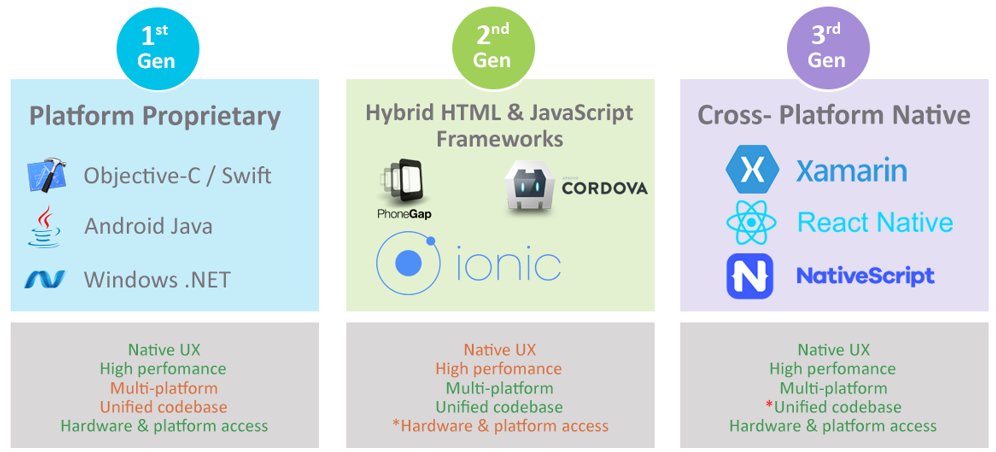
Image source: https://devopedia.org/
-
React Native
React Native is now one of the most well-liked frameworks for creating mobile apps for iOS and Android. With the help of this framework, programmers produce high-performance apps more quickly and with shorter development cycles. React Native is a one-stop shop for Android and iOS developers because it supports JSX (JavaScript XML).
-
Ionic
Ionic is an open-source platform that facilitates the creation of cross-platform mobile applications. Many mobile application developers prefer this framework. When developing a mobile app user interface, the Ionic framework provides UI feature elements like forms, filters, action sheets, list views, tab bars, and navigation menus. The most recent Android and iOS versions, as well as iOS 7, are supported by this framework.
-
Xamarin
The ability to use C# for iOS and Android or Universal for Windows mobile apps allows developers to create mobile apps with an innovative approach. It is a dependable technology that offers flexibility and performance for designing native apps, according to developers. Almost a million community developers are using Xamarin. Microsoft technology supports this framework as well, adding to its legitimacy.
Fact: You will be surprised to know that the on-demand mobile apps and websites earned a sales revenue of $15 billion in 2013, which is predicted to reach $335 billion by 2025.
-
JQuery Mobile
This type of JavaScript library includes several plug-ins, such as a content slider, pop-up boxes, and an image slider. When compared to JavaScript libraries, this framework is much simpler. The reason is that the same functionalities can be achieved with lesser code.
This foundation is crucial for making web pages interactive, user-friendly, and easier to browse. All search engines support JQuery, which is also SEO-friendly.
-
Corona SDK
This mobile app architecture aids programmers in building independent code bases that function well with iOS, Nook, and Android. The incredible features of Corona SDK include enhanced interactivity and high-resolution graphics. With Corona, you can effortlessly incorporate gaming APIs into your app and make it profitable right away.
Don't Know Which Technology to Choose for Mobile App?
Android Vs iOS
What are the most popular mobile operating systems? The answer is evident. Android and iOS are the most widely-used mobile app platforms and each has its own set of tools and technologies for developing a mobile app.
Android app development typically uses Java or Kotlin as the primary programming language and the Android SDK (Software Development Kit) as the primary development tool. The Android SDK includes tools for creating and testing Android apps, as well as a wide range of libraries and frameworks for building apps with specific functionality.
iOS app development, on the other hand, typically uses Swift or Objective-C as the primary programming language and the Xcode development environment as the primary development tool. Xcode includes a range of tools for creating and testing iOS apps, as well as a set of libraries and frameworks for building apps with specific functionality.
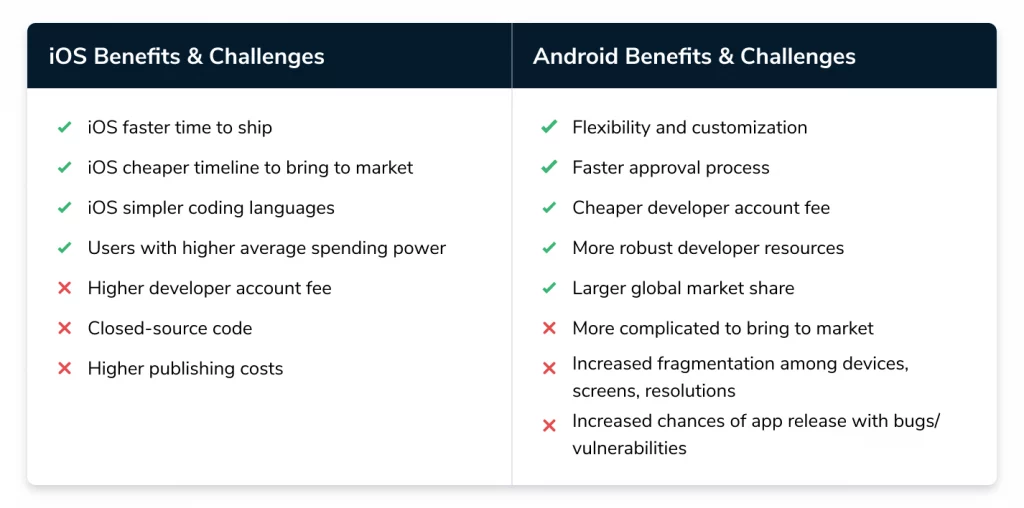
Image source: https://onesignal.com/
There are also some differences in terms of the platforms and devices that apps can be developed for. Android apps can be developed for a wide range of devices, including smartphones, tablets, and smart TVs, while iOS apps are typically developed for iPhone and iPad devices.
In terms of app distribution, Android apps can be distributed through the Google Play Store, which has a more open and lenient submission process compared to Apple’s App Store, which has a more strict and selective process.
In terms of development time, iOS development is considered to be faster than Android development, but this can vary depending on the specific app and the experience of the developer.
Summary: Both Android and iOS app development have their own set of tools, technologies, and best practices. A developer can choose to develop for one or both platforms depending on the target audience and the requirements of the app.
Ready to Discuss Your Idea for Developing Mobile App?
Mobile App Development Process
A successful mobile app development strategy demands a lot of attention to detail and a meticulous development process. It entails rigorous requirements analysis, frontend design, ongoing usability testing, and ultimately deployment methods.
The key to ensuring the success of your mobile app vision is to devote time and resources to the app development process.
Unfortunately, a lot of business-minded individuals overlook the fundamentals of developing a mobile app in their haste. These are the steps of the mobile app development process.
-
Research
Research is the most crucial part of the concept of your app. Your chances of success are bound to lessen if you don’t understand your market, the potential hazards, and the best strategy for your target audience.
The market for apps is incredibly crowded today. The majority of original thoughts aren’t original. It is crucial to create a product roadmap beforehand to avoid any hassles later.
Researching the past, present, and future of the market for your app is crucial for this reason. The most prosperous business people strive to have a thorough understanding of their markets.
-
A Viable Business Plan
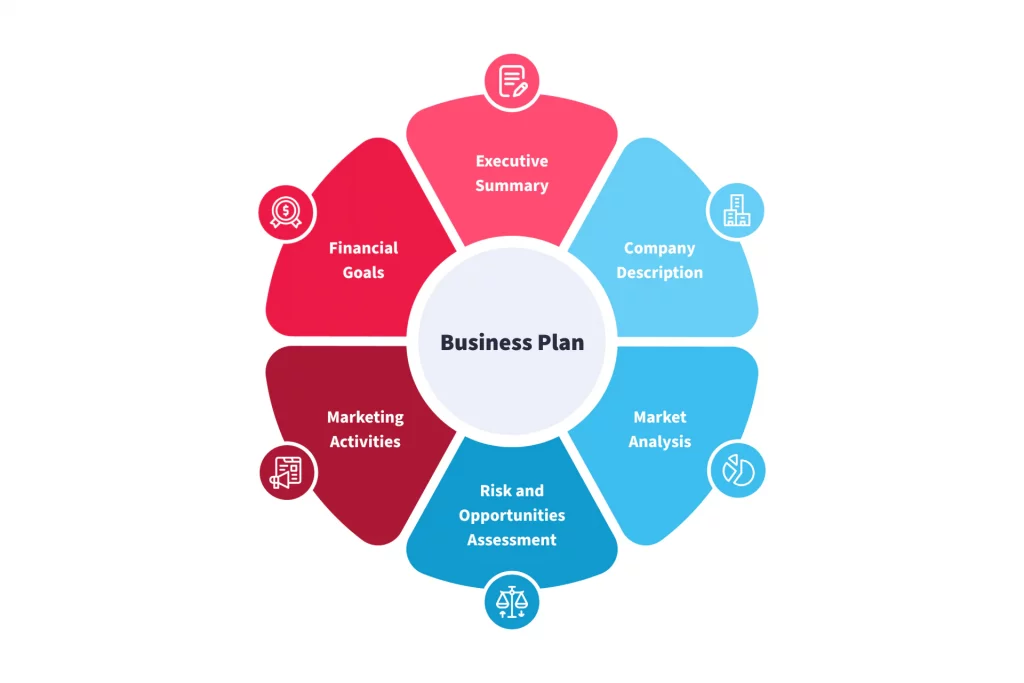
Image source: https://nix-united.com/
The next step of the mobile app development process is to compile all of the app requirements around that idea. It will aid in addressing :
- Who are the intended targets?
- What part of the world to target?
- What issue is the app attempting to address?
- What are the app’s functional requirements?
Run several brainstorming sessions and conduct target audience surveys to make informed conclusions regarding the requirements analysis. Remember that the process of mobile app development doesn’t just end after the code is created. Your business plan must include these parts as well. It comprises all connected operations, from tech support to marketing.
Recommendation: Present your company strategy to investors, partners, and other stakeholders, and take it seriously!
-
Prototyping and Design
In the third stage, known as the design phase, app designers work on creating user interfaces that are consistent with your brand identity. Spending adequate time on the design stage before moving on to the development phase is necessary because it is a crucial step. Wireframing, information architecture, producing prototypes, and usability testing are all processes in the design stage.
In General: A UX designer is primarily concerned with the experience users will have when using your app. Compared to UI, the term “UX” is far broader. Here, Business Analysts (BA) and designers collaborate largely on user flows, problem-solving, data analysis, functional design, analytics, etc. On the other hand, a UI designer collaborates with the frontend development team and is more concerned with aesthetics, originality, etc.
A mobile application prototype can be viewed as a form of user research that confirms a product’s strategic design direction. Design and prototypes are used to create a notion of the look and feel of the product in order to assess how consumers interact with and respond to the user interface and overall user experience.
-
App Development
It’s time to start working on the development state now that you have your finished design ready. In this stage, app developers write codes and turn those elaborate drawings into useful applications.
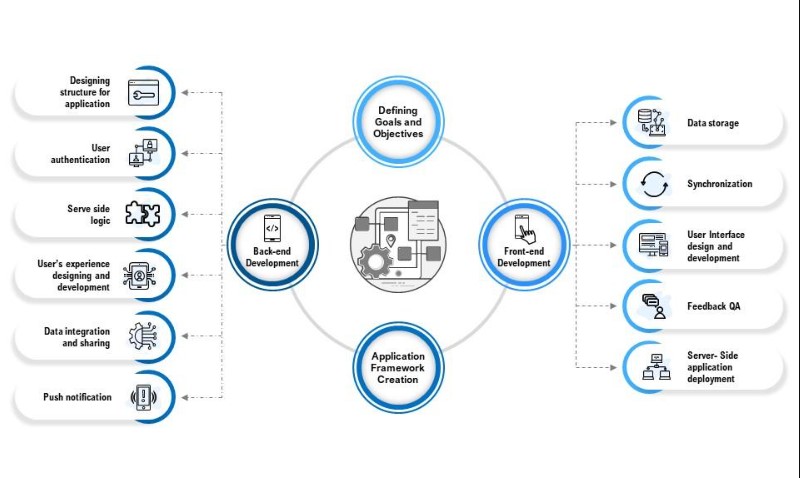
Image source: https://www.slideteam.net/
There are three major components of developing a mobile app:
-
Frontend Development:
Simply said the user interacts with the mobile app’s front end which is visible to him. There are a variety of front-end app development frameworks available to help front-end developers. They put all the written code and necessary files in one place to function properly on your finished app.
-
Backend Development:
A mobile app’s backend is its brain. The backend is responsible for many things, including data processing, storage, and security. The backend is the part of the app that you can’t see but is essential to how your mobile app functions.
-
Application Programming Interface Development:
An API is a group of protocols, procedures, functions, and instructions that programmers use to facilitate communication among various software services. The architecture of a mobile app is based on APIs.
Do you know? APIs enable data access between software services without the need for the developer to be aware of how the other service functions.
-
Quality Testing
Every stage of the roadmap for developing a mobile app should involve double-checking the quality. It includes manual testing, automated testing, prototype testing, code reviews, and unit testing. The mobile application is additionally tested in terms of elements like performance, security, and user interface to achieve assurance of value for the end-users.
In General, testing occupies 20 percent of the overall development time for a single-component application.
-
Deployment and Maintenance
Deployment is a crucial stage where the app is made accessible for download, regardless of whether it is the MVP or the fully-fledged application. At this point, a detailed marketing strategy timed to the app launch will aid in speeding up downloads.
You must submit your app to the various app stores to make it available for download. Both the Apple App Store and the Google Play Store have different requirements for app submission. Therefore, before you go through this process, you must comprehend all the different submission standards.
Developing a mobile app and launching is not sufficient. The app will need maintenance and updating, including bug finding and resolving, patching, and integration of new features based on the latest mobile app trends 2023.
How Much Does it Cost to Develop a Mobile App?
Are you curious about the price of application development? Everyone asks themselves that while considering how to build an app, whether it be for a mobile device, a web browser, or a standalone product.
The price of developing a mobile app varies depending on the kind of app you develop, how many features you include, how many hours you spend strategizing, designing, and creating it, etc. Other crucial factors to take into account include database complexity, maintenance expenses, the use of security regulations, additional expenditures related to third-party tools, etc.
Major Points:
- Keep in mind that each application has different features, team members, UI, etc., all of which contribute to the overall cost of developing a mobile app.
- An app that is ready to gain traction and turn users into devoted clients typically costs roughly $5,000 to $25,000 to develop.
- When integrating AI/ML, geolocation, and IoT features and functionality into your mobile solution, be prepared for the cost of mobile application development to increase dramatically.
Get a Free Estimate for Your App Idea
How can you monetize a mobile app?
A method of converting an asset into a source of income is monetization. If the spending is higher than the revenue collected, your application will fail, and you will suffer losses. On the other hand, your organization will profit substantially if new customers generate more revenue than you spent to acquire them.
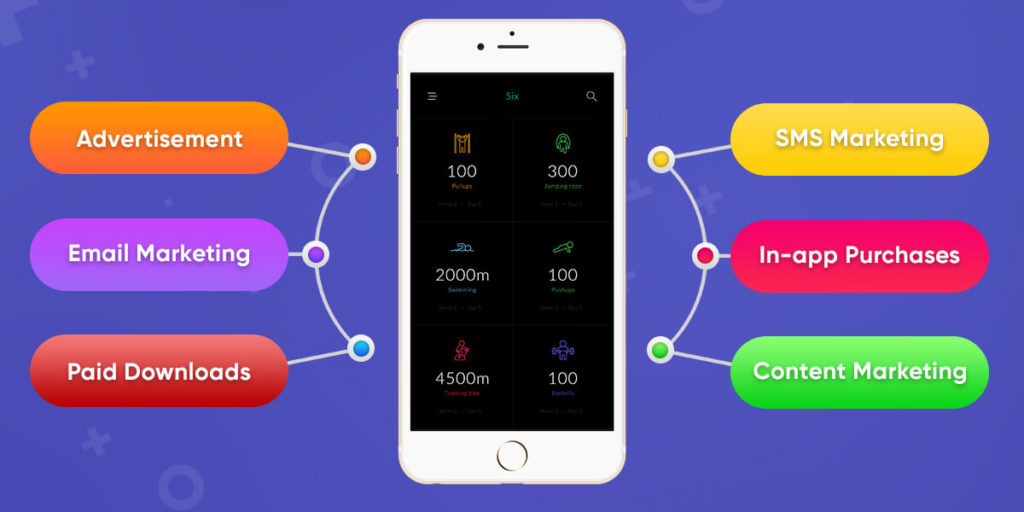
Image source: https://www.mindinventory.com/
-
Advertising
Many mobile app makers offer their consumers two ways to download and use their app: either they may pay a charge to access an ad-free version or they can download the app for free where they will view the adverts while using it. Both choices will generate money. Read Google’s documentation on how AdMob works.
Report: Ocean discovered that the value of in-game advertising was roughly 5.29 billion in 2020 and is expected to grow by over 19.5% in the period between 2021 and 2027.
-
Affiliate Marketing
Promotion of the goods and services of other companies through affiliate marketing is done in return for a commission. It is a win-win situation if you collaborate with a brand that appeals to you and matches your product portfolio. For instance, if you sell smartphones, you may partner with a business that sells personalized phone cases.
-
Generating Leads
Lead generation includes attracting potential customers through blog posts, surveys, discounts, job applications, and other internet content and turning them into loyal customers. Lead generation is effective because, instead of making cold calls, you can get in touch with someone who has previously expressed interest in your product and is already familiar with your brand.
-
Write Robust Code
You might be able to sell your code for reuse if you build solid reusable code. You can re-skin your code and sell it to other businesses if it is good enough. The market for implementing and integrating codes with other solutions has grown significantly because of plug-ins.
-
Subscription
Most SaaS (Software as a Service) organizations adopt the subscription monetization strategy. It enables you to draw customers and entice them to use your app frequently. Customers are charged monthly, quarterly, or annually, depending on the subscription option they choose.
According to a survey by Techjury, sales statistics show 48.2% of all mobile app earnings comes from In-app purchases. Paid app revenue comes second, with 37.8% of the total.
Features of Advanced Mobile App
-
Advanced User Interface
An advanced mobile application will typically have a user interface that is both visually appealing and easy to use. This can include features such as gesture-based navigation, which allows users to interact with the app through simple gestures like swipes and taps, rather than having to navigate through menus and sub-menus. Additionally, advanced mobile apps may include 3D animations and interactive visual elements to make the app more engaging and immersive.
-
Offline Functionality
An advanced mobile application has the ability to access certain features or perform certain tasks even when the device is not connected to the internet. This can include features like viewing saved content, editing documents, or making payments. This can greatly enhance the user experience, especially in areas with poor network coverage.
-
Push Notifications
Push notifications are a way for an app to send updates or new content to users, even when the app is not actively being used. This can include things like breaking news alerts, new message notifications, or special offers.
-
Location-based Services
An advanced mobile application can use the user’s location to provide relevant information or services. It includes options like providing directions to a nearby store, displaying information about nearby events or points of interest, or offering personalized recommendations based on the user’s location.
-
Multi-language Support
An advanced mobile application will often support multiple languages, making it accessible to a wider range of users. It includes features like providing translations of the app’s interface or offering different languages for voice commands or text input.
-
Integration with Social Media and Other Channels
An advanced mobile application can allow users to share content or information with other platforms or services. Using this feature, users can post updates to social media, send emails or text messages, or share files with other users.
-
Advanced Security Features
An advanced mobile application will typically have advanced security features to protect users’ data and information. Encryption, two-factor authentication, and biometric authentication are a few strategies that can be used to ensure robust security.
Read more: 10 Essential Mobile App Development Features You Can’t Afford to Miss
-
AR/VR Integration
An advanced mobile application may use AR/VR technology to enhance the user experience. This can include things like providing virtual tours of real-world locations, creating immersive gaming experiences, or allowing users to visualize products or spaces in 3D.
As per Statista, in 2021, the mobile augmented reality (AR) market was estimated to be worth 12.45 billion U.S. dollars. It is expected to reach 17 billion U.S. dollars in size in 2022, before jumping to over 36 billion U.S. dollars by 2026.
Conclusion
Statistics show that from 2020 to 2027, the size of the worldwide mobile application market would increase at a compound annual growth rate (CAGR) of 11.5%. This expansion indicates that businesses should build and release a mobile app as soon as possible.
We covered every aspect of mobile app development in this in-depth article to enable businesses to capitalize on this lucrative market. Having a mobile app gives you a competitive advantage regardless of your industry.
Technocrats Horizons is a leading technology solutions provider company that delivers excellent mobile app development services.
Get a Better Idea of How We Can Build a Scalable App for You
Get App Solutions That Immediately Stand Out!
Talk to our experts to understand how our app solutions can boost your productivity.


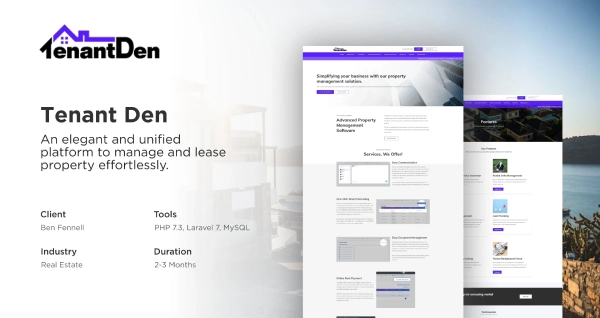

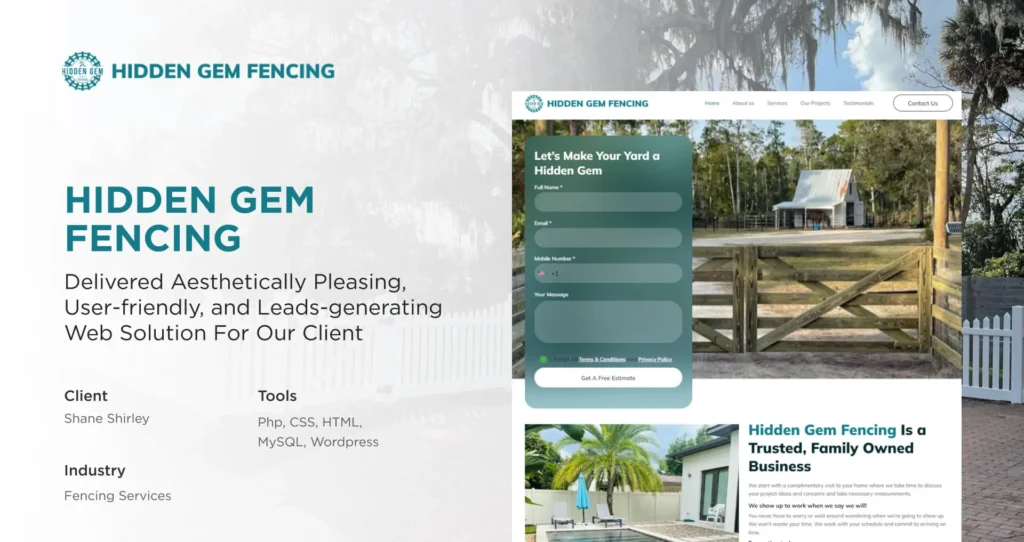
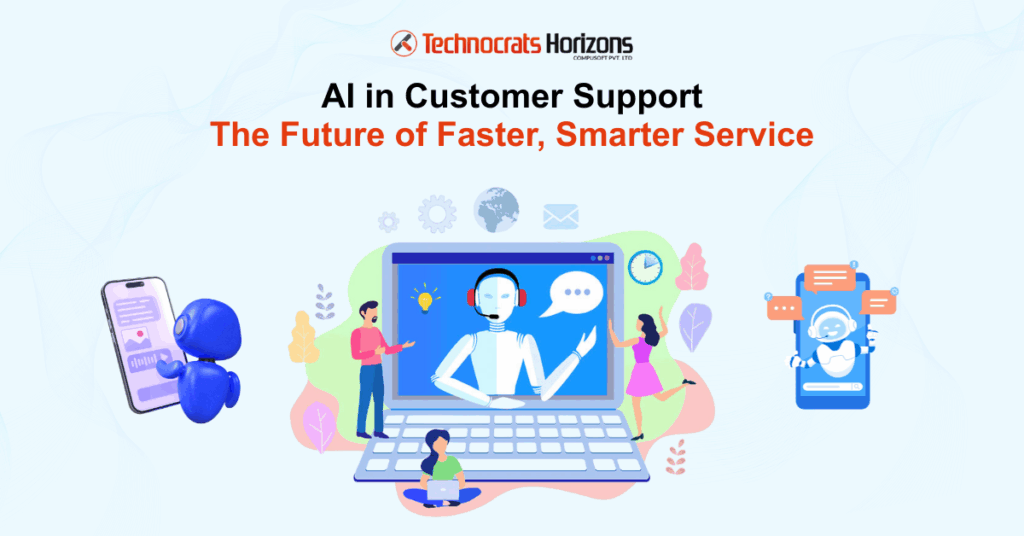





 Request a
Request a













